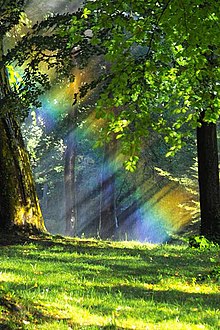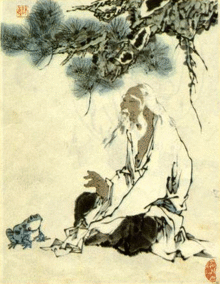Taoism
Appearance

is not the eternal Tao.
The name that can be spoken
is not the eternal Name. ~ Laozi
Taoism (or Daoism) is a philosophical and religious tradition that emphasizes living in harmony with the Tao (or Dao). The word "Tao" means "way", "path" or "principle", and in Taoism denotes something that is both the source and the driving force behind everything that exists. Taoist propriety and ethics may vary depending on the particular school, but in general tends to emphasize wu-wei (action through non-action), "naturalness", simplicity, spontaneity, and the Three Treasures: compassion, moderation, and humility.
Quotes
[edit]

- The Tao that can be expressed is not the eternal Tao; The name that can be defined is not the unchanging name.
Non-existence is called the antecedent of heaven and earth; Existence is the mother of all things.
From eternal non-existence, therefore, we serenely observe the mysterious beginning of the Universe; From eternal existence we clearly see the apparent distinctions.
These two are the same in source and become different when manifested.
This sameness is called profundity. Infinite profundity is the gate whence comes the beginning of all parts of the Universe.- Ch 1, as translated by Ch'u Ta-Kao (1904)
- The tao that can be described
is not the eternal Tao.
The name that can be spoken
is not the eternal Name.
The nameless is the boundary of Heaven and Earth.
The named is the mother of creation.
Freed from desire, you can see the hidden mystery.
By having desire, you can only see what is visibly real.
Yet mystery and reality
emerge from the same source.
This source is called darkness.
Darkness born from darkness.
The beginning of all understanding.- Ch. 1, as translated by J.H.McDonald (1996) [Public domain translation]

- Once upon a time, I, Zhuang Zhou, dreamt I was a butterfly, fluttering hither and thither, to all intents and purposes a butterfly. I was conscious only of my happiness as a butterfly, unaware that I was Zhou. Soon I awaked, and there I was, veritably myself again. Now I do not know whether I was then a man dreaming I was a butterfly, or whether I am now a butterfly, dreaming I am a man. Between a man and a butterfly there is necessarily a distinction. The transition is called the transformation of material things.
- Zhuangzi from Chuang-Tzu as translated by Lin Yutang
- Alternative translations
- Once upon a time, I, Zhuang Zhou, dreamt I was a butterfly, fluttering hither and thither, a veritable butterfly, enjoying itself to the full of its bent, and not knowing it was Zhuang Zhou. Suddenly I awoke, and came to myself, the veritable Zhuang Zhou. Now I do not know whether it was then I dreamt I was a butterfly, or whether I am now a butterfly dreaming I am a man. Between me and the butterfly there must be a difference. This is an instance of transformation.
- As translated by James Legge, and quoted in The Three Religions of China: Lectures Delivered at Oxford (1913) by William Edward Soothill, p. 75
- Once Zhuang Zhou dreamed he was a butterfly, a fluttering butterfly. What fun he had, doing as he pleased! He did not know he was Zhou. Suddenly he woke up and found himself to be Zhou. He did not know whether Zhou had dreamed he was a butterfly or a butterfly had dreamed he was Zhou. Between Zhou and the butterfly there must be some distinction. This is what is meant by the transformation of things.
- One night, Zhuangzi dreamed of being a butterfly — a happy butterfly, showing off and doing things as he pleased, unaware of being Zhuangzi. Suddenly he awoke, drowsily, Zhuangzi again. And he could not tell whether it was Zhuangzi who had dreamt the butterfly or the butterfly dreaming Zhuangzi. But there must be some difference between them! This is called 'the transformation of things'.
Quotes about Taoism
[edit]
- We believe that the Dudeist tradition started as a response to the excesses of civilization. That was Lao Tzu's deal anyway. Lots of similar traditions dealt with issues of work and status and anxiety and nature the same way. But they were all, pretty much, taken over by fascists and real reactionaries. Even Taoism was taken over by charlatans and phonies. But the pure undogmatic centre of lots of traditions (Christianity, Vedism, Buddhism etc) is all the same. And that's Dudeism.
- According to religious scholar Huston Smith, Taoism has only one basic text, the Tao Te Ching (or, in English, The Way and Its Power), a slim volume that, as Smith says, can be read in half an hour or a lifetime. Legend has it that a Chinaman by the name of Lao Tzu one day said “Fuck it” (loosely translated from the Chinese), hopped on a water buffalo (possibly with rust coloration), and started heading a-way out west to Tibet. … Regardless of whether the legend is true, or whether Lao Tzu even really existed, the Chinaman is not the issue here, Dudes. The issue is that the Tao Te Ching is the perfect expression of Taoism’s wu wei of life, or in the parlance of Huston Smith, a life of creative quietude in which “the conscious mind must relax, stop standing in its own light, let go” so that it can flow with the Tao (or Way) of the universe.
- Rev. Dwayne Eutsey, in the Inner-duction of the Dudeist holy book The Dude De Ching (2010)
- Taoism is romantic throughout. Firstly, it stands for the return to nature and the romantic escape from the world, and revolts against the artificiality and responsibilities of Confucian culture. Secondly, it stands for the rural ideal of life, art and literature, and the worship of primitive simplicity. And thirdly, it stands for the world of fancy and wonder, coupled with a childishly naive cosmogony.
- Lin Yutang, My Country and My People (1935), p. 117
- Tao mystics never talk about God, reincarnation, heaven, hell. No, they don't talk about these things. These are all creations of human mind: explanations for something which can never be explained, explanations for the mystery. In fact, all explanations are against God because explanation de-mystifies existence. Existence is a mystery, and one should accept it as a mystery and not pretend to have any explanation. No, explanation is not needed – only exclamation, a wondering heart, awakened, surprised, feeling the mystery of life each moment. Then, and only then, you know what truth is. And truth liberates.
- Osho (Bhagwan Shree Rajneesh), in Never Born, Never Died (2002)
- In China Taoism is one of the "three teachings" (along with Buddhism and Confucianism). It took shape only gradually, during a slow gestation that was actually a progressive integration of various ancient lines of thought. No precise date can be set for its birth, and the integration of outside elements into the religion has never ceased. If we add to this the enrichment of Taoism throughout its history with new revelations and new inspirations, we can see how open a religion it is, constantly progressing and evolving, and how difficult it is not only to date its first appearance but also to define its boundaries. Thus we can legitimately say, along with Livia Kohn, that "Taoism has never been a unified religion, and has constantly consisted of a combination of teachings based on a variety of original revelations." Thus it can be grasped only in its concrete manifestations, and it is meaningless to speak of Taoism as a whole. As I put this work together, however, I came to realize that if there is a single thread that runs through Taoism, it lies in its genealogy and in the cumulative and integrative process of its evolution.
- Isabelle Robinet in Taoism: Growth of a Religion (1992) as translated by Phyllis Brooks (1997), p. 2



